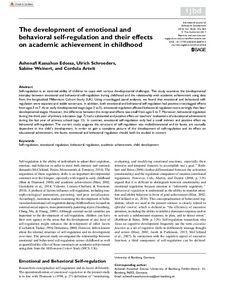The development of emotional and behavioral self-regulation and their effects on academic achievement in childhood
| dc.date.accessioned | 2021-02-10T11:26:45Z | |
| dc.date.available | 2021-02-10T11:26:45Z | |
| dc.date.issued | 2017-01-10 | |
| dc.identifier | doi:10.17170/kobra-202101273073 | |
| dc.identifier.uri | http://hdl.handle.net/123456789/12486 | |
| dc.description | Nationallizenz | ger |
| dc.language.iso | eng | ger |
| dc.rights | Urheberrechtlich geschützt | |
| dc.rights.uri | https://rightsstatements.org/page/InC/1.0/ | |
| dc.subject | self-regulation | eng |
| dc.subject | emotional regulation | eng |
| dc.subject | behavioral regulation | eng |
| dc.subject | academic achievement | eng |
| dc.subject | child development | eng |
| dc.subject.ddc | 150 | |
| dc.title | The development of emotional and behavioral self-regulation and their effects on academic achievement in childhood | eng |
| dc.type | Aufsatz | |
| dcterms.abstract | Self-regulation is an essential ability of children to cope with various developmental challenges. This study examines the developmental interplay between emotional and behavioral self-regulation during childhood and the relationship with academic achievement using data from the longitudinal Millennium Cohort Study (UK). Using cross-lagged panel analyses, we found that emotional and behavioral self-regulation were separate and stable constructs. In addition, both emotional and behavioral self-regulation had positive cross-lagged effects from ages 3 to 7. At an early developmental stage (ages 3 to 5), emotional regulation affected behavioral regulation more strongly than later developmental stages. However, the difference between the reciprocal effects was small from ages 5 to 7. Moreover, behavioral regulation during the third year of primary education (age 7) had a substantial and positive effect on teachers’ evaluations of educational achievement during the last year of primary school (age 11). In contrast, emotional self-regulation only had a small indirect and positive effect via behavioral self-regulation. The current study suggests the structure of self-regulation was multidimensional and its facets are mutually dependent in the child’s development. In order to gain a complete picture of the development of self-regulation and its effect on educational achievement, the facets emotional and behavioral regulation should both be studied in concert. | eng |
| dcterms.accessRights | open access | |
| dcterms.creator | Edossa, Ashenafi Kassahun | |
| dcterms.creator | Schroeders, Ulrich | |
| dcterms.creator | Weinert, Sabine | |
| dcterms.creator | Artelt, Cordula | |
| dc.relation.doi | doi:10.1177%2F0165025416687412 | |
| dc.subject.swd | Selbstkontrolle | ger |
| dc.subject.swd | Emotionsregulation | ger |
| dc.subject.swd | Verhaltenskontrolle | ger |
| dc.subject.swd | Schulerfolg | ger |
| dc.subject.swd | Kind | ger |
| dc.subject.swd | Entwicklung | ger |
| dc.type.version | publishedVersion | |
| dcterms.source.identifier | EISSN 1464-0651 | |
| dcterms.source.issue | Issue 2 | |
| dcterms.source.journal | International Journal of Behavioral Development (IJBD) | eng |
| dcterms.source.pageinfo | 192-202 | |
| dcterms.source.volume | Volume 42 | |
| kup.iskup | false |
Dateien zu dieser Ressource
Das Dokument erscheint in:
-
Publikationen [10]

